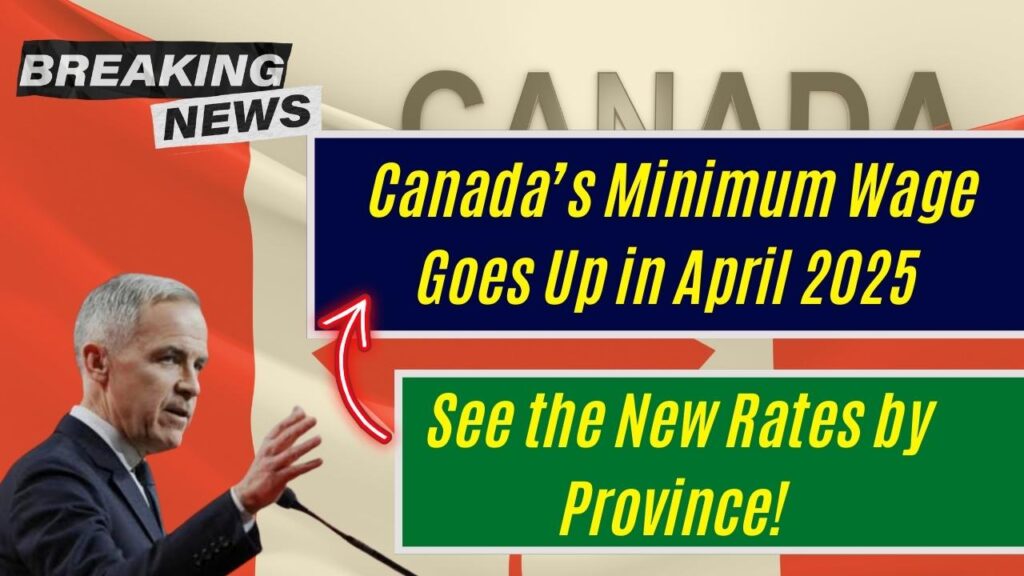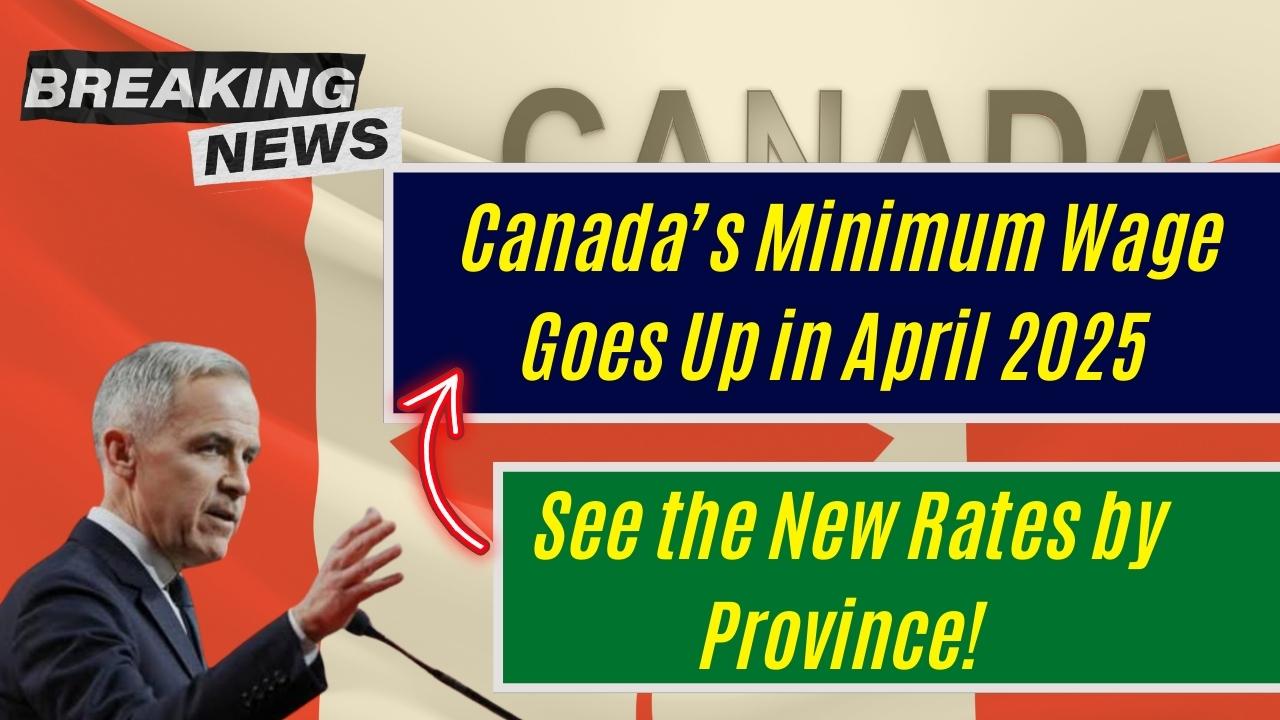Canada’s Minimum Wage Goes Up in April 2025 – Starting April 1, 2025, Canada’s minimum wage goes up, and the new rates vary across provinces and territories. This wage boost is aimed at helping workers keep pace with inflation and rising living costs. Whether you’re a student working part-time, a full-time employee, or a small business owner, understanding the updated minimum wage in Canada is crucial.

In this detailed guide, we’ll break down the latest wage rates by province, explain how these changes affect you, and offer tips for both employees and employers. We also link to official government sources to help you stay compliant and informed.
Canada’s Minimum Wage Goes Up in April 2025
| Feature | Details |
|---|---|
| Effective Date | April 1, 2025 (in most provinces) |
| Highest Minimum Wage | Nunavut – $19.00/hour |
| Lowest Minimum Wage | Alberta – $15.00/hour (unchanged since 2018) |
| Federal Minimum Wage | $17.75/hour for federally regulated sectors |
| Provinces Increasing Wage in April | Nova Scotia, Newfoundland & Labrador, Yukon, New Brunswick |
| Source | Government of Canada |
With Canada’s minimum wage going up in April 2025, it’s vital for both workers and businesses to understand the new rules. While the wage boost helps combat inflation, staying informed helps you protect your rights and your bottom line. Use this opportunity to plan your budget, review your payroll, and stay ahead of the curve.
What Is the Minimum Wage?
Minimum wage is the lowest legal amount an employer must pay a worker per hour. Each province and territory in Canada sets its own minimum wage, which may be adjusted yearly based on inflation, labour market trends, and cost of living.
If you work in a federally regulated industry like banking, airlines, or telecommunications, the federal minimum wage applies. However, if the provincial rate is higher than the federal one, employers must pay the higher amount.
New Minimum Wage Rates by Province in April 2025?
Here is a detailed breakdown of the new minimum wage rates in Canada, effective as of April 2025, unless otherwise noted:
| Province/Territory | New Minimum Wage (Hourly) | Effective Date |
|---|---|---|
| Federal (Canada-wide) | $17.75 | April 1, 2025 |
| Nova Scotia | $15.70 | April 1, 2025 |
| Newfoundland & Labrador | $16.00 | April 1, 2025 |
| New Brunswick | $15.65 | April 1, 2025 |
| Yukon | $17.94 | April 1, 2025 |
| British Columbia | $17.85 | June 1, 2025 |
| Quebec | $16.10 | May 1, 2025 |
| Ontario | $17.60 | October 1, 2025 |
| Prince Edward Island | $16.00 | October 1, 2025 |
| Manitoba | $16.00 | October 1, 2025 |
| Saskatchewan | $15.00 | October 1, 2024 |
| Alberta | $15.00 | October 1, 2018 |
| Northwest Territories | $16.70 | September 1, 2024 |
| Nunavut | $19.00 | January 1, 2024 |
Why This Matters: Real-World Impact?
These new rates affect millions of Canadians. For example:
- A student in Halifax earning $15.70/hour will see about $85 more per month working part-time compared to 2024.
- A grocery clerk in Whitehorse, now earning $17.94/hour, could earn $3,500 more per year than someone earning the old $16.77 rate.
This change also means employers must update payroll systems, employment contracts, and HR budgets.
Who Needs to Pay Attention?
For Workers:
- Check your province’s rate to ensure you’re being paid fairly.
- If you work in a federally regulated job, you are entitled to the higher of the federal or provincial rate.
For Employers:
- Failing to comply could result in penalties, back pay orders, and audits.
- Use payroll software or consult with a payroll professional to ensure you meet the new standards.
What Drives Minimum Wage Increases?
Governments typically adjust minimum wages to reflect:
- Inflation and Cost of Living Index (CPI)
- Recommendations from wage boards or commissions
- Political and public pressure from workers’ unions
For instance, Nova Scotia’s increase aligns with the province’s five-year plan to close the gap between minimum wage and the living wage.
Tips for Workers: Make the Most of the Increase
- Budget your new income wisely. Don’t forget taxes may still apply.
- Use online tools like Canada’s Benefits Finder to check if you qualify for additional credits.
- Consider part-time certifications or training to qualify for higher-paying jobs.
- Track your payslips to ensure your employer has implemented the correct rate.
- Save a portion of your increased income toward emergencies or retirement via a TFSA.
Tips for Employers: Stay Compliant
- Review your payroll and make adjustments before April 1, 2025.
- Notify your employees in writing about their new pay.
- Consider the impact on benefits, overtime pay, and tax deductions.
- Consult with your provincial labour board or visit Canada.ca Employment Standards.
- If you’re unsure, consult an HR consultant or employment lawyer to ensure full compliance.
Historical Perspective: How Wages Have Changed?
Here’s how minimum wages have evolved over the years in a few key provinces:
| Province | 2020 | 2022 | 2024 | 2025 (New) |
|---|---|---|---|---|
| Ontario | $14.00 | $15.50 | $16.55 | $17.60 |
| Quebec | $13.10 | $14.25 | $15.25 | $16.10 |
| BC | $14.60 | $15.65 | $16.75 | $17.85 |
This shows a trend of steady, inflation-adjusted growth, often exceeding 5% annually in provinces like BC and Quebec.
Canadian Dental Care Plan Opens to Millions in 2025 – How to Apply & What You’ll Get!
$1,700 GIS Benefit Boost Coming in April 2025 –Will you get it? Check Eligibility
$3,800 CPP Extra Payment Coming in April 2025 – Are You on the List? Payment Date
FAQs
1. What happens if my employer doesn’t follow the new minimum wage law?
Your employer can face legal action. You may be entitled to back pay, and the employer may pay fines.
2. Can employers pay less than minimum wage if I agree?
No. Minimum wage laws are non-negotiable. Even if you agree, it’s illegal for employers to pay less.
3. Does minimum wage apply to all workers?
Most hourly workers are covered, but some exceptions apply (e.g., certain internships, commissioned sales).
4. Do tips count toward minimum wage?
Some provinces like Quebec and Ontario have separate rates for liquor servers. Check your local rules.
5. Will the federal minimum wage increase again in 2026?
It’s likely. Annual adjustments are usually based on Consumer Price Index (CPI).
6. Can minimum wage affect my eligibility for government benefits?
Yes. An increase in your income might reduce or change your eligibility for income-tested benefits like the Canada Workers Benefit (CWB).
7. Are apprentices and interns entitled to minimum wage?
It depends on the province and whether the internship is part of an educational program. Always check your local regulations.










